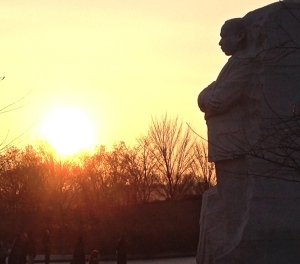Transformational Citizenship is a conversation.
My blog is a means of conversing about the principle that We the People have manifest the government we want. My purpose is to have us both transform our understanding of the rights and obligations of citizenship and act to effect a more perfect union.
Most Americans are deeply frustrated with the dysfunction of our government and polarized about nearly everything it does in our name. We are as divided about most questions before the Supreme Court as are the five-to-four justices, and we take opposing views about the motives as well as the actions of our presidents. The one idea that appears to unite us, increasingly, is that Congress is composed of self-righteous thieves who don’t understand our challenges, sell out to special interests, and care about one thing: getting reelected.
 My premise is that none of us is separate. Wrote Martin Luther King from a Birmingham jail: “We are caught in an inescapable network of mutuality, tied in a single garment of destiny. Whatever affects one directly, affects all indirectly.” The text A Course in Miracles states: “Our sense of inadequacy, weakness, and incompletion comes from the strong investment in the ‘scarcity principle’ that governs the whole world of illusions.” My vision, for my life and this blog, is that we the people understand, acknowledge and act on the reality that we are inextricably a part of each other and of the whole.
My premise is that none of us is separate. Wrote Martin Luther King from a Birmingham jail: “We are caught in an inescapable network of mutuality, tied in a single garment of destiny. Whatever affects one directly, affects all indirectly.” The text A Course in Miracles states: “Our sense of inadequacy, weakness, and incompletion comes from the strong investment in the ‘scarcity principle’ that governs the whole world of illusions.” My vision, for my life and this blog, is that we the people understand, acknowledge and act on the reality that we are inextricably a part of each other and of the whole.
In his message to Congress dated December 1, 1862, not yet half way through what would be a four-year war, Abraham Lincoln wrote: “As our case is new, so we must think anew, and act anew. We must disenthrall ourselves, and then we shall save our country.” To disenthrall means to free from a controlling force or influence. Lincoln urged our forebears to discard beliefs that were destroying the country. Now as then, our sense of separateness diminishes our potential.
Though I have views about the “right” policies and purposes of government, that is not my concern here. Rather it is the approach to the process of governing that I have observed grow over a 40-year career studying Congress: the ends justify the means. I have watched politicians manipulate neutral rules to serve political minorities: State legislatures gerrymander districts to maximize partisan advantage disproportionate to the voters’ ballots; the majority controlling the House of Representatives operates on the principle expressed in 2003 by Speaker Dennis Hastert that the only bills to be considered are those supported by a majority within the party caucus; the Senate, with specified exceptions (the budget, presidential nominees), allows 41 percent of the body to determine outcomes. These practices grow more entrenched, and they are a source of alienation between the voters and their representatives. The people see that their will is thwarted, and the representatives find they are captured by the minority they have selected as their constituents. In defiance of our majoritarian culture, these practices exacerbate our separateness. They are also what we want.
We the people are more interested in getting our way than in reasoning together and respecting results that emerge from hashing out compromise. This shows up in our conversations, in the comments sections of news sites, in the style of many talk shows. We have created our separate echo chambers, charged by the fear that we are neither heard nor understood. And so we do not listen.
Opinions are neither true nor false; they are an expression of one’s experience. My proposition is that we are one, self-governing people.
